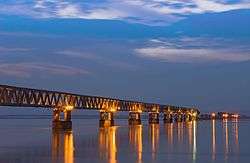Bogibeel Bridge
| Bogibeel Bridge | |
|---|---|
 | |
| Carries | Motor vehicles, Railway |
| Crosses | Brahmaputra River |
| Locale |
Dibrugarh district, Assam, |
| Characteristics | |
| Design | Truss bridge |
| Material | Steel, Concrete |
| Total length | 4.94 kilometres (3.07 mi) |
| Longest span | 125 metres (410 ft) |
| History | |
| Construction begin | 21 April 2002 |
| Construction end | expected 2017 |
Bogibeel bridge is a combined road and rail bridge in the Dibrugarh district of the north eastern Indian state of Assam. Upon its expected completion in 2017[1] the 4.94 kilometres (3.07 mi) long bridge, work on which was inaugurated in 2002, will become the longest bridge of its kind in India and the longest bridge across the Brahmaputra River.[2]
Location
The Bogibeel bridge, situated 17 kilometres (11 mi) downstream of Dibrugarh, spans the Brahmaputra river and will connect the town of Dibrugarh in the south to Dhemaji to the river's north.[3] The bridge is located just over 20 kilometres (12 mi) away from the Assam- Arunachal Pradesh border and is thus expected to act as an alternative to the Tezpur bridge in providing connectivity to nearly five million people residing in Upper Assam and Arunachal Pradesh.[4][5]
Bogibeel is the fourth rail-road bridge to come up across the river in Assam. Due to its location, the bridge will be of strategic importance to India as it will significantly enhance India's ability to transport troops and supplies to its border with China in Arunachal Pradesh.[5] Being located in an area of intense rainfall, construction has been significantly slowed down by the fact that construction largely takes place only during a period of four dry months between November and March.[6]
Rail connectivity
Bogibeel bridge will provide a connection between the Rangia-Murkongselek section of the North East Frontier Railway on the north bank of Brahmaputra and Lumding–Dibrugarh section that lies to the south of the Brahmaputra.[4] A New Dibrugarh Railway Station, expected to be the largest in the region, has been proposed and is to be linked to the Rangia - Murkongselek line via Chaulkhowa and Moranhat. The Railways have initiated the gauge conversion of the Dhamalgaon to Sisiborgaon rail line to the north of the bridge and commissioned the 44 kilometres (27 mi) long Chalkhowa - Moranhat line to the south.[5]
History
The Bogibeel bridge traces its origins to the Assam Accord of 1985 and was one of several major infrastructural projects to be set up in Assam in accordance with the pact.[7] It was sanctioned by the Government of India when H D Deve Gowda was the Prime Minister in 1997-98 and was expected to be completed by the end of the Ninth Five Year Plan.[8] However, construction began only in 2002 with the then Prime Minister, A.B. Vajpayee, laying the foundation stone on 21 April 2002.[9] After several years of slow progress, the Bogibeel bridge was granted a national project status by the Government of India in 2007. Accordingly, the Union Ministry of Finance is now funding 75% of the project costs while the Ministry of Railways will finance the rest.[4]
The bridge was planned to be completed within seven years of the laying of foundation stone but has since witnessed huge time and cost overruns. Initially estimated at ₹17.67 billion, the cost of completion has since escalated to ₹32.30 billion and the final cost is expected to be around ₹49.96 billion.[10][11] Bogibeel bridge is slated to be completed by the March 2017.[12] The Northeast Frontier Railway contracted Gammon India in April 2008 to construct the sub-structure of the bridge while a consortium of Hindustan Construction Company, DSD Brouckenbau GmbH, Germany and VNR Infrastructures have won the bid to build the superstructure.[13]
Structure
The design of Bogibeel bridge has 42 pillars with 125 metres (410 ft) spans and a superstructure of composite welded steel truss and reinforced concrete. It is designed to carry a double line broad gauge railway and a 3-lane road on the lower and upper decks. Upon completion it will be the longest bridge over the Brahmaputra and the longest combined rail and road bridge in India. However due to late completion this bridge will be overtaken as longest bridge over Brahmaputra by Dhola-Sadiya Bridge which is a road bridge of length 9.15 KM[2][3]
References
- ↑ "Bogibeel Rail-Cum-Road Bridge Project Targeted for Completion by March 2017". Government of India. Press Information Bureau. 25 July 2014. Retrieved 25 July 2014.
- 1 2 "Bogibeel Bridge project marks 10 years with slow work progress". Times of India. April 21, 2012. Retrieved 26 May 2013.
- 1 2 "Bogibeel Rail Bridge, India". Retrieved 26 May 2013.
- 1 2 3 "A long wait for longest bridge in country". The Indian Express. May 6, 2012. Retrieved 26 May 2013.
- 1 2 3 "Strategic Brahmaputra bridge to be ready by 2015?". Zee News. April 26, 2012. Retrieved 26 May 2013.
- ↑ "Wet season major constraint for India's longest rail-cum-road bridge". Retrieved 26 May 2013.
- ↑ "'Assam Accord still vital'". Frontline. 27 (17). 14–27 August 2010. Retrieved 26 May 2013.
- ↑ "Note of conciliation". Frontline. 21 (25). 4–17 December 2004. Retrieved 26 May 2013.
- ↑ "Even after a decade, Bogibeel bridge waits to see light of the day". The Sentinel. April 22, 2012. Retrieved 26 May 2013.
- ↑ "Bogibeel Rail-Cum-Road Bridge Project Targeted for Completion by March 2017". Government of India. Press Information Bureau. 25 July 2014. Retrieved 25 July 2014.
- ↑ "Railways battle to complete strategic Brahmaputra bridge by 2015". Daily News. April 25, 2012. Retrieved 26 May 2013.
- ↑ "Bogibeel Rail-Cum-Road Bridge Project Targeted for Completion by March 2017". Government of India. Press Information Bureau. 25 July 2014. Retrieved 25 July 2014.
- ↑ "HCC, associates bag Rs 987-cr railway order". The Hindu Businessline. 24 November 2011. Retrieved 26 May 2013.